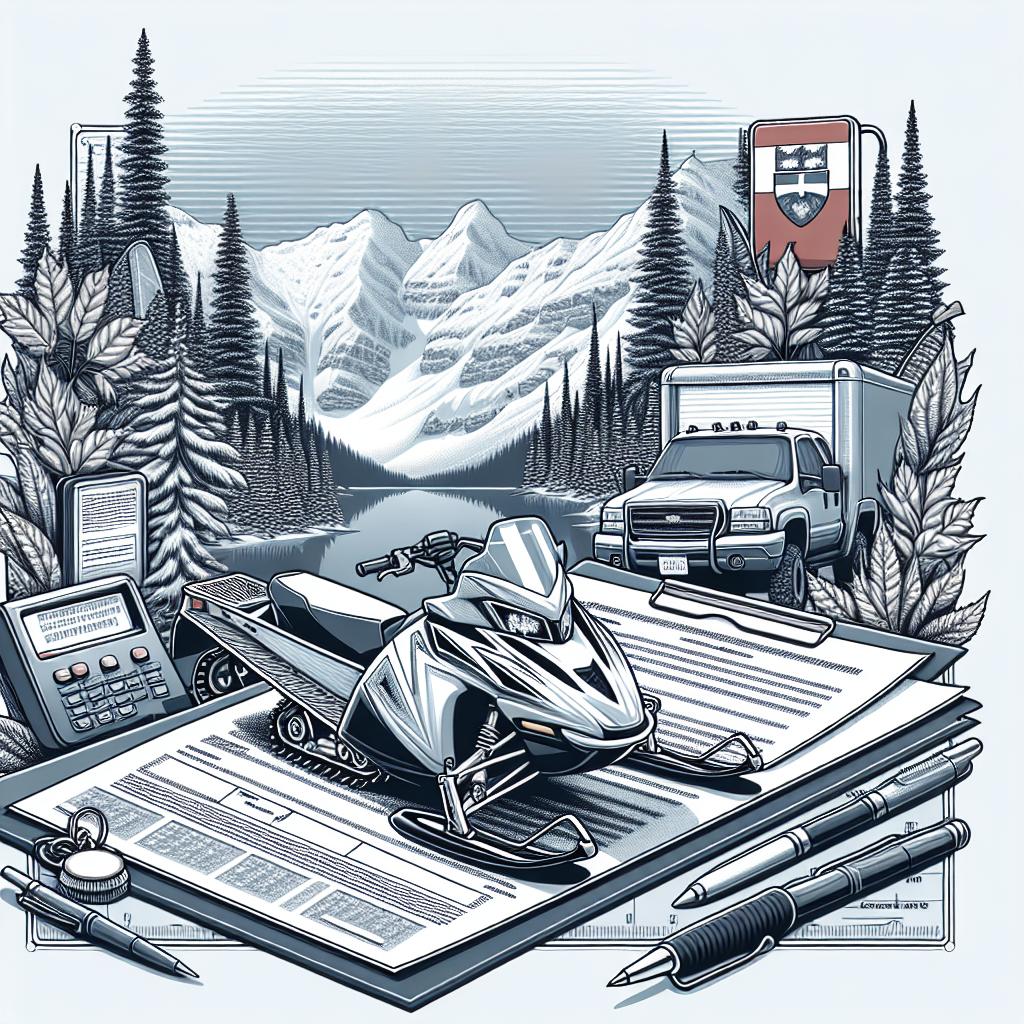“`html
Aujourd’hui, de plus en plus de gens s’adonnent aux sports d’hiver pour explorer les paysages enneigés de l’Ontario. Parmi ces loisirs, la motoneige se distingue comme une activité exaltante. Cependant, avant de partir à l’aventure sur les pistes, il est essentiel de savoir comment obtenir un permis de motoneige en Ontario. Ce guide détaillé vous expliquera où vous pouvez pratiquer ce sport, les règles de sécurité à suivre ainsi que les implications légales à respecter. Qu’il s’agisse de conseils sur le port du bon équipement ou des lignes directrices sur la vitesse et l’alcool, ce guide vous préparera à vous lancer en toute confiance.
Aperçu
Avant de vous lancer dans l’arène blanche de l’Ontario, obtenir le bon permis est essentiel pour s’assurer que vous respectez toutes les régulations provinciales. En Ontario, tous les opérateurs de motoneige doivent détenir le permis approprié, ce qui implique généralement d’être titulaire d’un permis de conduire valide. De plus, il est obligatoire de compléter un programme de formation certifié, spécialement conçu pour apprendre les rudiments de la manipulation sécuritaire d’une motoneige.
Le processus d’obtention d’un permis commence souvent par une inscription en ligne ou auprès d’une école de motoneige agréée. Les cours incluent une combinaison de formation théorique et pratique et se terminent généralement par un examen final qui évalue vos aptitudes en tant que conducteur sûr et préparé. Une fois obtenu, ce permis vous permet de profiter pleinement des divers sentiers aménagés pour la motoneige à travers la province.
Où peut-on circuler avec sa motoneige?
L’Ontario offre un vaste réseau de sentiers dédiés à la motoneige, facilitant ainsi l’accès à de magnifiques paysages enneigés pour les aventuriers de l’hiver. Il est essentiel de se munir d’une carte à jour des sentiers pour s’assurer de circuler dans des zones autorisées. Les sentiers sont régulièrement entretenus par des clubs de motoneige locaux qui veillent à la sécurité et à la commodité des parcours.
Outre les sentiers désignés, certains terrains publics peuvent également être accessibles, à condition de vérifier préalablement la législation locale. Les terres privées sont généralement interdites à la circulation sans l’accord explicite du propriétaire. Toujours respecter la signalisation et les indications présentes sur le terrain fait partie intégrante du code de conduite des motoneigistes responsables.
Conseils de sécurité et équipement de protection
Voyager en motoneige sur un terrain enneigé peut être une activité aussi stimulante qu’exigeante, d’où l’importance de s’équiper correctement. Un casque homologué est obligatoire et constitue l’un des éléments fondamentaux de protection contre les blessures. D’autres équipements appropriés incluent des gants isolants, des lunettes de protection, et un vêtement résistant à l’eau et au vent.
Outre l’équipement, il est capital de connaître les règles de sécurité telles que garder toujours sa droite sur les sentiers, respecter les signalisations et maintenir une vitesse de croisière sécuritaire. La formation préalable aide à inculquer ces aspects de sécurité, garantissant que chaque excursion en motoneige est une aventure agréable et sans incident.
Limites de vitesse
Les limites de vitesse pour la motoneige en Ontario sont établies pour maintenir la sécurité sur les sentiers tout en assurant une expérience agréable aux étudiants. Typiquement, la vitesse maximale autorisée est de 50 km/h sur la plupart des sentiers, tandis que dans certaines zones plus restreintes, elle peut être abaissée à 20 km/h. Ces limites aident à prévenir les accidents potentiels liés à une vitesse excessive.
Être attentif aux conditions de la neige et des sentiers peut influencer votre vitesse. Des conditions difficiles, comme la glace ou la mauvaise visibilité, rendent prudent un ralentissement pour maintenir le contrôle du véhicule. Par conséquent, être conscient de son environnement et ajuster sa vitesse en conséquence fait partie intégrante de la conduite responsable sur les sentiers.
Pratique de la motoneige avec les facultés affaiblies
La conduite d’une motoneige sous l’influence de l’alcool ou de drogues est non seulement dangereuse, mais également illégale. L’Ontario applique des lois strictes concernant la conduite en état d’ébriété, ce qui inclut l’utilisation de véhicules récréatifs comme les motoneiges. En enfreignant ces lois, vous risquez des amendes sévères et des suspensions de permis.
Il est essentiel de planifier à l’avance pour éviter la tentation de boire et de conduire. Si vous envisagez de consommer de l’alcool, assurez-vous d’avoir un moyen sûr de retourner chez vous, comme un service de transport ou un conducteur désigné. Assurez la sécurité de tous en respectant les règles et en protégeant les vies sur le sentier.
Perspectives futures
| Point Clé | Description |
|---|---|
| Permis Obligatoire | Un permis de motoneige et un permis de conduire valide sont requis pour conduire légalement une motoneige en Ontario. |
| Réseau de Sentiers | Accessibilité aux sentiers balisés et maintenus par des clubs locaux pour la pratique de la motoneige. |
| Sécurité et Équipement | Casque obligatoire et utilisation d’équipement approprié pour une protection optimale. |
| Limites de Vitesse | Respect de la vitesse légale de 50 km/h sur les sentiers, ajustable selon les conditions. |
| Responsabilité et Alcool | Interdiction stricte de la conduite sous l’influence d’alcool ou de drogues. |
“`

